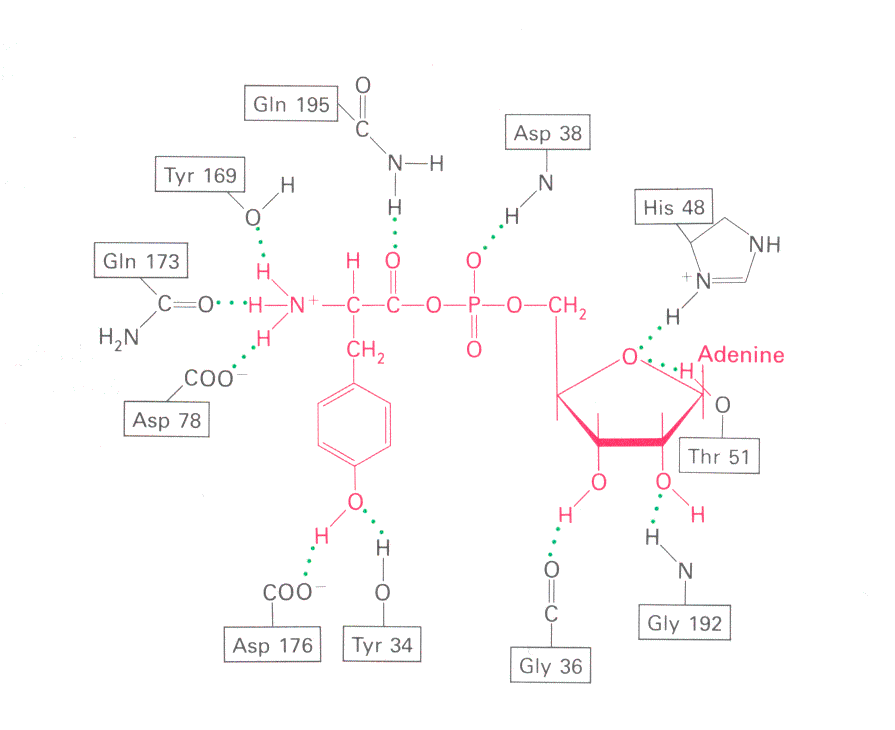
| MadSci Network: Biochemistry |
Hi Jithesh,
The chirality of life is one of the great mysteries of science. As you know, all proteins are made using left-handed (levorotatory or l) amino acids (although some right-handed (dextrorotatory or d) amino acids are used in the cell walls of bacteria). To date, we don't know why this is, but early life-forms, or perhaps even pre-biotic enzyme systems, likley had to choose one over the other, for resons that you will see in a bit.
You're asking what would happen if you tried to make proteins using right-handed amino acids. During protein synthesis, the mRNA sequence directs the ribosome in choosing tRNA molecules charged with the proper amino acid (charged tRNAs). The charged tRNAs serve as the "adaptors" between the triplet nucleotide (codon) sequences of genes and the amino acid sequences of proteins. So, even though you are supplying right-handed amino acids, they will first have to be incorporated into the tRNAs if they are going to be incorporated into a protein.
Now, tRNA molecules are charged (that is, they have amino acids put onto them) by special activating enzymes called amino-acyl tRNA synthetases. I'll just call them synthetases here. There are 20 different synthetases, one for each of the 20 different amino-acids, and each synthetase recognizes all of the correct tRNA molecules (remember that while there are only 20 amino acids, there are 61 different tRNAs) for the appropriate amino acid. Synthetases carry out their charging reactions with an incredibly high degree of fidelity. If they didn't, the wrong amino acid would be put onto a tRNA, and proteins would be made with the wrong amino acid sequence. These proteins probably wouldn't work right, and the organism would die. So, all of the organisms with sloppy synthetase enzymes died billions of years ago.
The amino acid binds to the active site of its particular synthetase in a highly coordinated
interaction. I have a nice figure (taken without permission) from Biochemistry by
L. Stryer, detailing the bonding contacts between a tyrosyl-AMP molecule (tyrosine attached
to an AMP, an early step in the tRNA charging pathway) and the active site of the tyrosine
tRNA synthetase.

In this figure, you can see that two hydrogen-bonding contacts are made between the active site (residues ASP 176 and TYR 34) and the phenolic side group of the tyrosine, and that a contact is made between the active site (residue GLN 195) and the ester group connecting the tyrosine to the AMP. No other amino acid will satisfy the geometry of these interactions, so that only tyrosine will fit this active site. Now, imagine that we are looking at the right-handed version of tyrosine, with the phenolic group pointing up instead of down. I think that you can see that the contacts with ASP 176 and TYR 34 would not be made, and that the large size of the side group would interfere with the contact with GLN 195. Basically, the right- handed tyrosine would not fit into the active site of tyrosine tRNA synthetase, and as a result the tyrosine tRNAs could not be charged with the right-handed amino acid.
This is almost certainly true for all enzymes that are specific for a given amino acid, and this is most likely why early pre-biotic and biological systems were forced to choose between left- and right-handed amino acids.
So, the answer to your question is, "No. Translation machinery cannot make peptides if supplied with only right-handed amino acids."
You can find quite a bit more information about amino-acyl synthetases, translation and tRNA molecules in any college-level biochemistry textbook. I recommend Biochemistry by L. Stryer.
Keep asking those questions!
Try the links in the MadSci Library for more information on Biochemistry.